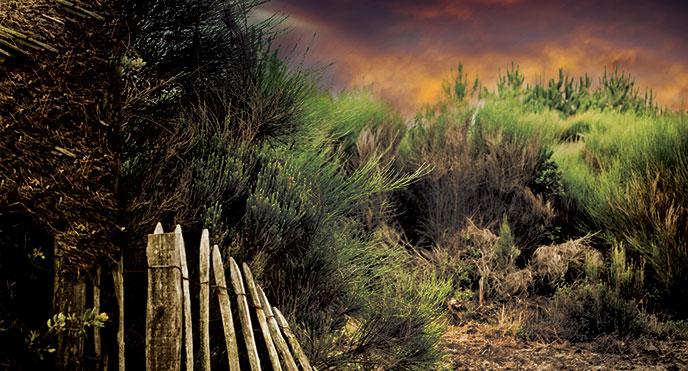The village of Saltleigh, the setting of my new novel The Crooked House, is a place that has inhabited the shadows of my imagination for a very long time—in much the same way as it has haunted the dreams of my protagonist, Esme Grace. It didn’t occur to me to write about the bleak, grey east coast of England, and most specifically the muddy maze of rivers and estuaries that fan out from the mouth of the Thames, when first I began writing fifteen years ago. What spurred me and stimulated me and gave me confidence then was the experience of living in Florence, Italy, where I encountered a geography and culture as different from the marshy delta where Saltleigh sits and the grey England of my childhood as can be imagined.
opens in a new window |
The lesson, maybe, is that the crucial element in translating the real into the fictional is distance. I wrote about Florence and Italy when I returned to England and longed to be back there: I saw its foreignness, its loveliness, its sinister side, its characters—the impulse to recreate it was irresistible. But what grew on me as I completed one novel after another was the understanding that I was and would always be a foreigner there, and that if I wanted to expand my imagination and emotional range, sooner or later I would need to examine my own place—but to do that, I needed distance. I needed not to have considered it for years. I needed to have half-forgotten what happened there if I was to be able to return to it in my imagination and make it a place of wonder—and of fear. I needed it to come back to me; I couldn’t go in search of it.
The Essex marshes are, in a complicated sense, my place. London is where I was born, but after ten years we moved out to Essex, where my mother’s family came from—a little village called Hockley behind the arcades and funfairs of Southend, a kind of Coney Island for London sitting where the estuary widens, in the shadow of the tanks and refineries of Canvey Island. Even before we moved out of London, Essex was where we went for our holidays—never abroad in the sixties; it was still austerity Britain for most of us. We picnicked on the sea wall at North Fambridge or borrowed my grandmother’s house in Frinton.
Our return there, though, was complicated and painful, and increasingly so: My mother died after four years, my father remarried (to a woman with four children of her own), and together we moved from a large and comfortable Essex wool-merchant’s house to a big Thames sailing barge, moored in the mud. Like Esme’s family, we did not feel accepted into the community: We were out on the edge of things, with no mains electricity; our clothes smelled of diesel and mud and damp; our schoolbooks were splotched with mildew and the rust stains from the water that leaked through the boat’s decks. And it is this sense of being out on the far edge of the land and of community, of not belonging, of being exiled and alone (and increasingly mired in a toxic family breakdown) that, as much as the landscape itself, informed my descriptions of Saltleigh.
Which is not to say that the physical landscape is irrelevant, or that Saltleigh could have been anywhere: Those planes of grey and brown and silver stretching out to the horizon have, for me, an extraordinary, unearthly, disturbing beauty, the sea walls that snake in and out mysteriously evoking the fluidity of boundaries, the impermanence of land masses. There is something about living where the colors of land and sea dissolve that is marvelously stimulating to the imagination, or to mine at least. At the estuarial extremity, the horizon is open; you can see for miles and miles—and be seen, too. In such a flat and unforgiving place, crime and transgression sit on the surface. There’s nowhere to hide but down in the mud, buried like the odd timbers of ancient Saxon structures and disintegrating boats that eventually will be uncovered by some freak low tide or shifting of the riverbed.
Inland, of course, there are secret places, but I for one feel buried alive when too far from the sea, and, interestingly, the city to which I have been exiled for the last twenty-five years, Cambridge, is about as far from the sea as you can get on a small island like ours. So this is where distance comes in: This far from the coast—this far from the unhappiness of the time I spent there—I can absorb it, understand it, or at least write about it. I put Esme there to unpick the horrors of her past, because for me she could be nowhere else.
Christobel Kent was born in London and was educated at Cambridge. She has lived variously in Essex, London, and Italy. Her childhood included several years spent on a Thames sailing barge in Maldon, Essex, with her father, stepmother, three siblings, and four step-siblings. She now lives in both Cambridge and Florence with her husband and five children.
YOU MIGHT ALSO LIKE:
The Other Side of the Wall by Sloane Crosley
On Lucia Berlin: The World in Perpetual Motion
An Excerpt of Luc Sante’s The Other Paris
Arthur Bradford on not writing for 14 years

